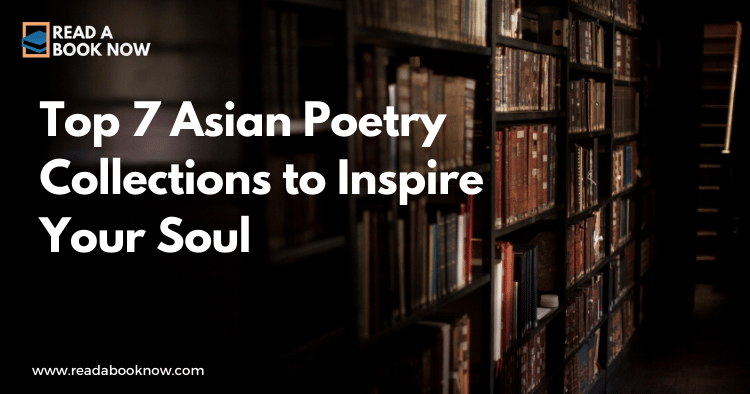Table of Contents
- Introduction
- 1. *The Sunflower Sutra* by Allen Ginsberg
- 2. *The Collected Poems of Langston Hughes*
- 3. *The Complete Poems of Emily Dickinson*
- 4. *The Poetry of Rumi*
- 5. *The Book of Chuang Tzu*
- 6. *The Essential Rumi* by Coleman Barks
- 7. *Where the Sidewalk Ends* by Shel Silverstein
- Conclusion
- FAQs
Introduction
Poetry has the power to transcend boundaries, cultures, and time. Asian poetry, in particular, offers a rich tapestry of voices that reflect diverse experiences, philosophies, and emotions. Whether you’re seeking solace, inspiration, or a deeper understanding of the human condition, these collections will surely touch your heart and stir your soul. Here’s a carefully curated list of seven Asian poetry collections that promise to inspire and uplift.
1. *The Sunflower Sutra* by Allen Ginsberg
Ginsberg’s *The Sunflower Sutra* is a pivotal piece in the Beat Generation’s poetic landscape. The poem captures the struggle against conformity and the harsh realities of urban life, intertwining personal anguish with social commentary. Ginsberg’s vivid imagery and emotional honesty create a powerful narrative that resonates with readers seeking authenticity.
The sunflower stands tall, a beacon of hope amidst the concrete jungle.
Why It Inspires:
- Theme of Resilience: The sunflower symbolizes hope and resilience amidst despair.
- Cultural Critique: Ginsberg critiques materialism and advocates for a deeper connection with nature and humanity.
Learn more about Allen Ginsberg’s work and its impact on American poetry from Poetry Foundation.
2. *The Collected Poems of Langston Hughes*
Langston Hughes, a key figure of the Harlem Renaissance, explores the African American experience through a lens that intersects with broader Asian themes of identity and struggle. His poems celebrate cultural pride and resilience, making them universally relevant.
“Life is for the living. Death is for the dead.”
Why It Inspires:
- Cultural Heritage: Hughes’s work reflects the richness of African American culture, often paralleling the struggles faced in Asian communities.
- Emotional Depth: His poignant explorations of love, loss, and hope resonate deeply with readers.
*Discover more about Langston Hughes’s influence on poetry at Academy of American Poets.
3. *The Complete Poems of Emily Dickinson*
Though Dickinson is not Asian, her themes often resonate with Asian poetic traditions. Her exploration of nature, death, and the self invites readers into a contemplative space that mirrors the reflective nature of Asian poetry.
“Hope is the thing with feathers that perches in the soul.”
Why It Inspires:
- Universal Themes: Dickinson’s exploration of existence transcends cultural boundaries.
- Introspective Style: Her concise, evocative language encourages readers to ponder their own lives.
*For more insights into Dickinson’s life and poetry, visit The Emily Dickinson Museum.
4. *The Poetry of Rumi*
Rumi, the 13th-century Persian poet, is renowned for his spiritual and mystical poetry. His verses delve into love, the divine, and the interconnectedness of life, making his work timeless and universally appealing.
“The wound is the place where the Light enters you.”
Why It Inspires:
- Spiritual Depth: Rumi’s poetry inspires readers to seek spiritual enlightenment and embrace love.
- Cultural Bridge: His work serves as a bridge between Eastern and Western philosophies.
*Explore more about Rumi’s influence on literature through The Rumi Network.
5. *The Book of Chuang Tzu*
This ancient Chinese text is a collection of philosophical writings attributed to Chuang Tzu, a foundational figure in Daoism. The text combines allegory and parable to convey profound philosophical insights about life, nature, and the universe.
“To forget the whole is to lose the part.”
Why It Inspires:
- Philosophical Wisdom: The teachings encourage readers to embrace spontaneity and the natural flow of life.
- Metaphorical Richness: The use of allegory provides layers of meaning that invite deep reflection.
*Learn more about Daoist philosophy and Chuang Tzu’s contributions at Stanford Encyclopedia of Philosophy.
6. *The Essential Rumi* by Coleman Barks
Coleman Barks’s translations of Rumi’s work make the poet’s profound insights accessible to contemporary readers. This collection includes some of Rumi’s most celebrated poems that explore love, spirituality, and the human experience.
“Don’t grieve. Anything you lose comes round in another form.”
Why It Inspires:
- Accessible Language: Barks’s translations retain the essence of Rumi while making the poetry relatable.
- Emotional Resonance: The themes of love and longing speak to universal human experiences.
*For a deeper understanding of Rumi’s impact on poetry and spirituality, check out Rumi’s World.
*
7. *Where the Sidewalk Ends* by Shel Silverstein
Shel Silverstein’s whimsical poetry often draws from a childlike perspective, inviting readers of all ages to explore imagination and creativity. While not strictly Asian, his playful language and themes of adventure resonate with the spirit of many Asian folk tales.
“The place where the sidewalk ends is a place where you can create your dreams.”
Why It Inspires:
- Playful Imagination: Silverstein encourages readers to embrace their creativity and see the world through a playful lens.
- Universal Themes: His themes of friendship, love, and adventure are enjoyed across cultures.
*Discover more about Shel Silverstein’s life and works at Poetry Foundation.
*
Conclusion
Asian poetry is a treasure trove of wisdom, emotion, and beauty. The collections listed above offer a glimpse into the diverse voices that have shaped the poetic landscape. Whether you are seeking inspiration, comfort, or a deeper understanding of life, these works will undoubtedly resonate with your soul.
FAQs
What is the significance of Asian poetry in the literary world?
Asian poetry encompasses a wide range of styles and themes, reflecting the rich cultural diversity of the continent. It often explores profound philosophical concepts, nature, love, and social issues, making significant contributions to global literature.
How can I start reading Asian poetry?
Start by exploring anthologies that feature a variety of poets from different Asian cultures. Visit local bookstores, libraries, or online platforms that specialize in poetry to find collections that resonate with you.
Are there contemporary Asian poets I should know about?
Yes! Poets like Ocean Vuong, Mary Jean Chan, and Fatimah Asghar are making waves in the contemporary poetry scene. Their works often address identity, culture, and personal experiences.
How does Asian poetry differ from Western poetry?
Asian poetry often emphasizes brevity, metaphor, and philosophical depth, reflecting cultural values and traditions. In contrast, Western poetry may focus more on individualism and personal expression. However, both forms share common themes of love, nature, and the human experience.
Feel free to explore these collections and let the words of these remarkable poets inspire you! Also, for those interested in exploring more literary works, check out our articles on Top 10 Timeless Asian Classics Every Book Lover Should Read and 10 Must-Read Feminist Classics that Changed Literature.




